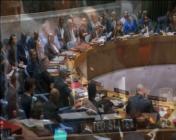ISIS COULD REGAIN CONTROL OF SYRIA WITHIN A YEAR, PENTAGON REPORTS
A US troop withdrawal could allow a nearly defeated ISIS to regain control of their lost territory in Syria, a draft report claims.
BY REUTERS, BEN BRESKY
FEBRUARY 1, 2019 05:24
1 minute read.
ISIS fighter beheading boy, 16, in Syria. (photo credit: ARAB MEDIA)
ISIS could regain control of Syrian territory within six to 12 months, according to a draft of the Department of Defense Inspector General Quarterly Report on the ongoing Syrian situation.
Analysts fear the impending pullout of US troops would created a vacuum filled by the extremist group. US President Donald Trump has ordered all of the approximately 3,000 US troops to leave the civil war-torn country within 120 days. The Islamic State of Iraq and Syria gained infamy in 2014 with terrorist attacks, beheadings and public proclamations of a worldwide Islamic caliphate.
Analysts fear the impending pullout of US troops would created a vacuum filled by the extremist group. US President Donald Trump has ordered all of the approximately 3,000 US troops to leave the civil war-torn country within 120 days. The Islamic State of Iraq and Syria gained infamy in 2014 with terrorist attacks, beheadings and public proclamations of a worldwide Islamic caliphate.
Last week, US Defense Secretary Patrick Shanahan said Islamic State is expected to lose its final bits of territory in Syria to U.S.-backed forces within a couple of weeks.
The Kurdish-led Syrian Democratic Forces, which have been backed by 2,000 U.S. troops and air support, are preparing for a final showdown with Islamic State in eastern Syria after driving the fighters from the towns and cities that once formed the group's self-proclaimed caliphate.
Secretary of State Mike Pompeo warned that "we need to continue to do all that we can to make sure that there's not a resurgence of ISIS or that all the other variants of that terror regime continue to be under pressure," in an interview with Fox News on Wednesday.
The Syrian Civil War began in 2011 with President Bashar Assad fighting against the Free Syrian Army and other rebel forces causing millions to flee the country. Russia, Turkey, Iran, the Kurds and others have played a role in the conflict over the past seven years.
Syria is Israel's neighbor to the north but its involvement in the conflict has been limited to defending its border from stray rocket fire and Iranian involvement. Israel has also provided medical treatment to civilian victims of the conflict.
The Pentagon's full report on US intervention against ISIS in Syria, dubbed Operation Inherent Resolve, is expected to be released next week.
Join Jerusalem Post Premium Plus now for just $5 and upgrade your experience with an ads-free website and exclusive content. Click here>>


















